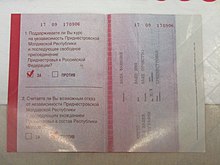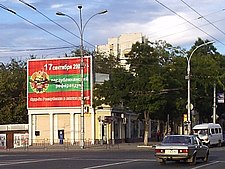| Revision as of 15:28, 25 November 2022 editDurian Farmer (talk | contribs)Extended confirmed users13,642 editsmNo edit summary← Previous edit | Revision as of 17:17, 28 January 2023 edit undoPppery (talk | contribs)Interface administrators, Administrators100,522 edits Looks fine to meNext edit → | ||
| Line 1: | Line 1: | ||
| {{cleanup|reason=needs reference cleanup and formatting.|date=August 2018}} | |||
| {{Use dmy dates|date=November 2013}} | {{Use dmy dates|date=November 2013}} | ||
| {{infobox referendum | {{infobox referendum | ||
Revision as of 17:17, 28 January 2023
| ||||||||||||||||||||||
| Do you think it is possible for the Moldovan Republic of Transnistria to renounce its independence and then join the Republic of Moldova? | ||||||||||||||||||||||
| Results | ||||||||||||||||||||||
|---|---|---|---|---|---|---|---|---|---|---|---|---|---|---|---|---|---|---|---|---|---|---|
| ||||||||||||||||||||||
| Do you support the course for the independence of the Moldovan Republic of Transnistria and the subsequent voluntary accession of Transnistria to the Russian Federation? | ||||||||||||||||||||||
| Results | ||||||||||||||||||||||
|---|---|---|---|---|---|---|---|---|---|---|---|---|---|---|---|---|---|---|---|---|---|---|
| ||||||||||||||||||||||
| Politics of Transnistria |
|---|
 |
| Constitution |
| Executive |
|
LegislatureSupreme Council
Speaker Alexander Korshunov Political parties |
Elections
|
Administrative divisions
|
Foreign relations
Diplomatic missions of / in Transnistria |
A double referendum was held in Transnistria on 17 September 2006. Voters were asked whether they approved of the possibility of renouncing independence and integration with Moldova, or alternatively independence and a possible future integration into the Russian Federation.
Background
Pro-Moldovan organisations announced before the referendum that they would not recognise its results. Ballots for the referendum were reprinted three times, as the chairman of electoral commission, Piotr Denisenko, announced a shrinkage of electorate of 7% compared with previous year.
Results

Renouncing independence and potential future integration into Moldova
| Choice | Votes | % | |
|---|---|---|---|
| For | 10,308 | 3.39 | |
| Against | 294,253 | 96.61 | |
| Invalid/blank votes | 5,608 | – | |
| Total | 310,169 | 100 | |
| Registered voters/turnout | 394,861 | 78.55 | |
| Source: Direct Democracy | |||
Independence and potential future integration into Russia
| Choice | Votes | % | |
|---|---|---|---|
| For | 301,332 | 98.07 | |
| Against | 5,905 | 1.93 | |
| Invalid/blank votes | 2,932 | – | |
| Total | 310,169 | 100 | |
| Registered voters/turnout | 394,861 | 78.55 | |
| Source: Direct Democracy | |||
Of the total of 394,861 registered voters, the voter turnout was 78.6%, substantially more than the 50%+1 required by law to validate the referendum. On the day of the referendum, no exit polling was allowed within 25 meters of polling stations, to prevent disruption of voting.
Reactions

International organisations, such as the Organisation for Economic Co-operation and Development, European Union, GUAM, and some other countries (Ukraine, Romania, Bulgaria, Turkey, Serbia, Macedonia, Croatia, Montenegro, Bosnia, Albania, Norway, Iceland) did not recognise the referendum.
According to Russian News Agency RIA Novosti, more than 130 international observers monitored the referendum and reported that "they did not register any procedural violations during the secret balloting", and the representative of the Congress of Russian Communities from Moldova declared that the referendum was held according to international standards. However, no internationally recognised monitoring organisations had observers present.
Viktor Alksnis, a deputy from the Russian party "Rodina" stated that referendum in Transnistria was held without any violations of legislation and democratic standards. Viktor Alksnis is known to have previously described the Transnistrian Republic as the base from which the Soviet Union's restoration would begin.
In the opinion of the Ukrainian foreign ministry, the situation in Transnistria fails to meet the conditions of a free will expression by citizens.
According to the OSCE, the media climate in the Transdniestrian region is restrictive, as authorities there continue a long-standing campaign to silence independent opposition voices and movements. Although the OSCE decided not to send any observers to monitor the referendum, 130 observers from CIS and Europe and from eleven election monitoring organizations who did attend the referendum had different reactions.
In contrast, the Helsinki Committee for Human Rights in Moldova (HCHRM) claims to have observed a series of infringements at the referendum:
- Groups of activists going into people's homes, especially in Tiraspol and Bender districts, asking why they did not come to the referendum, and threatening that after the referendum they will be forced to look for a new home in Romania.
- At some voting stations agents dressed in civil or militia uniforms forcing the observers from outside the sections to stay at a distance of 200–250 meters far from these places.
- "Cleaning" of the list of voters by excluding some citizens who previously boycotted elections and referendums held in Transnistria.
- "Electoral tourism" and multiple voting
Karel De Gucht (Chairman of the OSCE) expressed an opinion about the "lack of basic requirements for free and fair elections, such as freedom of the media, freedom of assembly and political pluralism, in the region pre-determined the results" and argued that the questions in the referendum are suggestively worded. In a possible manipulation of the public opinion, people are asked to choose between freedom ("free association") and loss of independence ("renounce the Transnistria's independent status"), between reality ("support the course") and possibility ("consider it possible") This formulation could have resulted in a response bias.
Victor Josu, deputy editor-in-chief of Russian-language Moldovan newspaper Moldavskiye Vedomosti, an accredited observer, described the referendum as a successful public relations action (regardless of violations and a lack of recognition) and reported favorably on a comparison between "recognized Chişinau" and "unrecognized Tiraspol" in an article which emphasized the openness, transparency and glasnost of the referendum process.
Sergei Bagapsh, president of Abkhazia (Abkhazia claims independence from Georgia, but has a disputed status), has said his republic "supports the aspirations of Transniestria toward independence and its choice of unification with Russia."
See also
- Elections in Transnistria
- Human rights in Transnistria
- Politics of Transnistria
- Proposed Russian annexation of Transnistria
References
- "Transnistrische Moldawische Republik (Moldawien), 17. September 2006 : Verzicht auf Unabhц╓ngigkeit - [in German]". Sudd.ch. Retrieved 26 February 2015.
- "Transnistrische Moldawische Republik (Moldawien), 17. September 2006 : Unabhц╓ngigkeitskurs und Beitritt zu Russland - [in German]". Sudd.ch. Retrieved 26 February 2015.
- "MOLDOVAN NGOs REGARD TRANSNISTRIAN REFERENDUM AS A FARCE". Archived from the original on 27 September 2007. Retrieved 29 April 2007.
- "Ольвия-Пресс". Olvia.idknet.com. Archived from the original on 24 September 2015. Retrieved 26 February 2015.
- "Tiraspoltims.com". Archived from the original on 29 September 2011. Retrieved 19 February 2016.
- "CHISINAU OFFICIALS DO NOT RECOGNISE TRANSNISTRIAN REFERENDUM'S PRELIMINARY RESULTS". Archived from the original on 27 September 2007. Retrieved 19 February 2016.
- "Exit-polls can be held in Transdnestr not closer than 25 m to polling stations - Russian News - REGNUM". Regnum.ru. Archived from the original on 30 September 2007. Retrieved 26 February 2015.
- "OSCE will not recognize results of referendum in Transnistria". Archived from the original on 27 September 2007. Retrieved 19 February 2016.
- Archived 21 July 2011 at the Wayback Machine
- "Russia Blocked Council of Europe Declaration Regarding the Disapproval of Transnistria Referendum". Archived from the original on 8 October 2007. Retrieved 19 February 2016.
- "Moldpres.md". Archived from the original on 27 February 2015. Retrieved 19 February 2016.
- "Transdnestr for independence, union with Russia - referendum / Sputnik International". En.rian.ru. 18 September 2006. Archived from the original on 25 September 2006. Retrieved 26 February 2015.
- "International observer: Referendum in Transdnestr conforms to international norms - Russian News - REGNUM". Regnum.ru. Archived from the original on 27 February 2015. Retrieved 26 February 2015.
- "Ольвия-Пресс". Olvia.idknet.com. Archived from the original on 8 November 2007. Retrieved 26 February 2015.
- John Mackinlay and Peter Cross (editors), Regional Peacekeepers: The Paradox of Russian Peacekeeping, United Nations University Press, 2003, ISBN 92-808-1079-0 p. 137
- Archived 27 September 2007 at the Wayback Machine
- "Osce.org". Archived from the original on 9 September 2015. Retrieved 19 February 2016.
- "Moldova's independence-seeking Transnistria region votes, but effect is uncertain". Archived from the original on 24 September 2008. Retrieved 19 February 2016.
- "Международные наблюдатели остались довольны ходом приднестровского референдума: Бывший СССР". Lenta.ru. 18 September 2006. Retrieved 26 February 2015.
- "HCHRM CLAIMS A SERIES OF INFRINGEMENTS AT THE REFERENDUM ON INDEPENDENCE IN TRANSNISTRIA". Archived from the original on 27 September 2007. Retrieved 19 February 2016.
- "IPN". Info-prim.md. Retrieved 26 February 2015.
- "Noticias.info". Archived from the original on 25 May 2011. Retrieved 19 September 2006.
- "Жители Приднестровья выбрали Россию: Бывший СССР". Lenta.ru. 18 September 2006. Retrieved 26 February 2015.
- "Ольвия-Пресс". Olvia.idknet.com. Archived from the original on 24 September 2015. Retrieved 26 February 2015.
- "Interfax.ru". Archived from the original on 5 February 2012. Retrieved 19 February 2016.
External links
- "International observer: Referendum in Transdnestr conforms to international norms" Regnum News
- "Moldova's Trans-Dniester Votes in Referendum on Whether to Pursue Independence" Voice of America News
- Transdnestr independence plebiscite RIA Novosti
- OSCE reaction
- Final monitoring report by international observers
- Transdniester Conflict Was Long In The Making Radio Free Europe
| Presidential elections | |
|---|---|
| Parliamentary elections | |
| Municipal elections | |
| Referendums | |
| See also: Elections and referendums in Moldova and in Gagauzia | |
| Background | |||||||
|---|---|---|---|---|---|---|---|
| Transnistria War | |||||||
| Post-war developments | |||||||
| Resolution attempts |
| ||||||
| Participants and figures |
| ||||||
| See also | |||||||